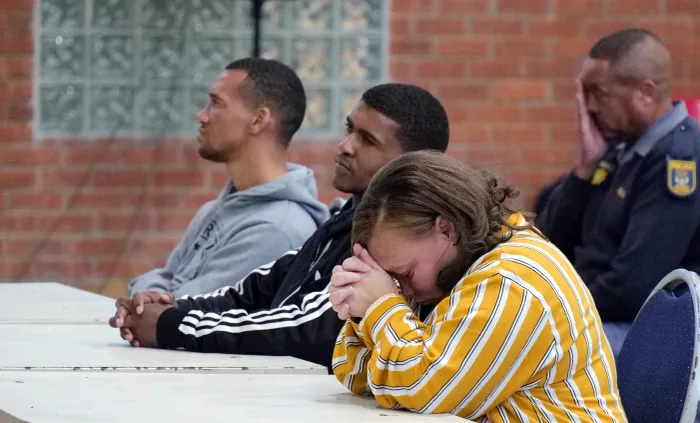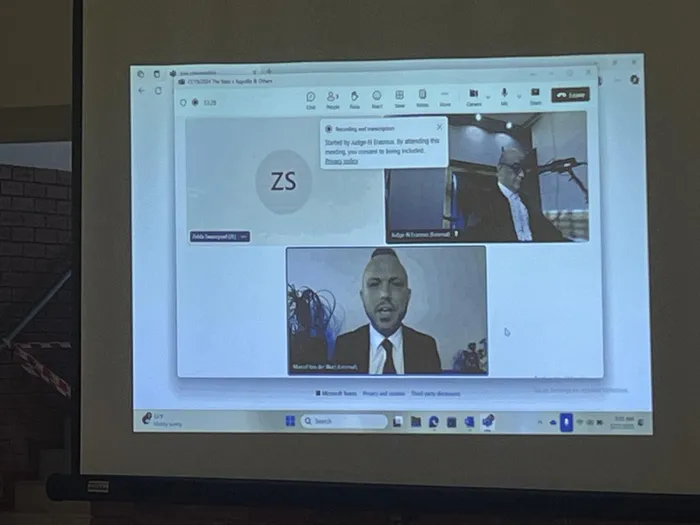Joshlin’s kidnapping a calculated crime, says human trafficking expert

Racquel ‘Kelly’ Smith, her boyfriend Jacquen ‘Boeta’ Appollis, and their friend Steveno ‘Steffie’ van Rhyn were found guilty of kidnapping and trafficking six-year-old Joshlin Smith in the Western Cape High Court.
Image: Ian Landsberg / Independent Media
Evidence strongly suggests no other alternative but that little Joshlin Smith was sold for exploitation in a calculated crime.
This is according to a human trafficking expert from the US who testified during sentencing proceedings in the Joshlin Smith kidnapping trial on Tuesday.
Jacquen ‘Boeta’ Appollis, Steveno van Rhyn, and Kelly Smith were convicted of human trafficking and kidnapping of seven-year-old Joshlin earlier this month.
The little girl went missing on February 19, 2024. She has not been found to date.
The trio will learn their fate this week as sentencing proceedings get underway.
Dr Marcel van der Watt, who is based in the US, delivered his testimony via Microsoft Teams to the court.

Human trafficking expert, Dr Marcel van der Watt was streamed in to give his testimony to the court.
Image: Supplied
With 23 years of expertise in the field, Van der Watt, a former police officer in South Africa, has assisted the FCS Unit, SAPS’ Hostage Negotiation Unit, and Hawks.
Van der Watt provided the court with a detailed 35-page report for sentencing proceedings. In his report, he said the case demonstrates clear evidence of planning and premeditation.
Smith had devised a plan to sell Joshlin as early as August 2023.
"This indicates significant forethought and intent, as the accused had ample time to consider and deliberate over the nature of her actions and the consequences for Joshlin," the report read.
It further stated: “This was not a spontaneous act but a calculated crime. The evidence also strongly suggests no other alternative but that Joshlin was sold for exploitation.
"This aligns with the established patterns of trafficking crimes, where victims are treated as commodities with financial earning potential. The accused knowingly commodified Joshlin, prioritising their financial motives over her well-being and safety,” van der Watt testified.
He said there was a common purpose and agreement among the three accused and Laurentia Lombaard (former accused turned state witness).
The agreement entailed that Joshlin would be sold and that all parties involved would maintain silence, thereby obstructing justice and concealing their actions.
"This level of coordination and secrecy points to a shared intent and complicity in the crime. It is clear that all three accused, along with Lombaard, were aware of, or should have reasonably known, that Joshlin was being sold for exploitation."
Van der Watt said the financial motive underscores the calculated nature of this crime, as the exploitation of Joshlin was not incidental but rather a means to an end for their benefit.
“When considering the mosaic of evidence and circumstances in this case, it becomes undeniable that the accused engaged in a deliberate, premeditated process to exploit Joshlin. From the initial planning stages to the concealment of their actions, every step was marked by intentionality and coordination, driven by financial greed at the expense of a vulnerable child.”
“The accused's decision to refrain from testifying in their defense further strengthens the need to draw adverse inferences, as their silence in the face of such compelling evidence suggests an unwillingness or inability to refute the allegations against them,” Van der Watt said.
He said the talks of trafficking Joshlin as early as August 2023 demonstrated the central role in the trafficking process.
“Kelly Smith, as the mother, played a particularly significant role as the orchestrator of the plan, pointing to significant culpability on her part. Similarly, Appollis and Van Rhyn also played vital roles in enabling and reinforcing the trafficking process. Collectively, their actions solidified the lies and deception, entrapping the victim, unbeknownst to her, in a web of inevitable harm,” he said.
The betrayal by a parent, the very person entrusted to protect and nurture their child, is particularly heinous and significantly aggravates the offense, Van der Watt stated.
The court also heard it is very likely that Joshlin suffered abuse.
“While the exact details of her abuse remain unclear due to her unknown whereabouts, it is highly unlikely that Joshlin did not endure harm. The mention of her physical traits, such as her eyes and light-colored skin, suggests she may have been subjected to exploitation. It would be disingenuous to assume she was placed in such a situation merely for admiration. Evidence relating to harm and child abuse paints a grim picture, and it is very plausible that Joshlin experienced severe abuse, either physical and/or psychological,” Van der Watt said.
“Joshlin’s story is by no means isolated; it symbolises the thousands of other children who have vanished into the shadows, many of whose disappearances were never recorded, and the thousands more who will suffer the same fate unless decisive action is taken. The lack of an integrated information management system for trafficking in persons (TIP) and the lack of a systematic and transparent process for preventing, documenting, and addressing missing children in South Africa are unacceptable gaps that perpetuate this crisis,” Van der Watt said.
Cape Times